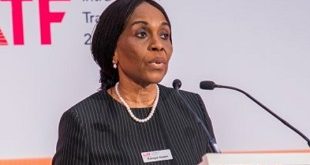 The commencement of free trade in Africa trade was expected to increase intra-African trade from 18% to about 50% within a few years. Is that timetable still on?
The commencement of free trade in Africa trade was expected to increase intra-African trade from 18% to about 50% within a few years. Is that timetable still on?
We aim to reach up to 50% of intraAfrican trade between now and 2030. So, there is not that much time. COVID-19 aside, whether we can reach 50% of intraAfrican trade depends on our capacity to accelerate regional value chains in Africa’s industrial development. Second, the manner and pace with which we implement the agreement, collectively, will also determine whether we increase that number from 18% up to 50%, and hopefully above that. So, it is an objective that we will have to actively work towards, and we will have to vigorously pursue.
Are there fears that the pandemic could encourage some countries to adopt protectionist policies?
The AfCFTA, like many other trade agreements around the world, makes provisions for countries to take measures to protect and advance public health in times of crisis. There is a degree of flexibility within trade agreements for countries to take particular measures to protect public health. However, these measures should not be permanent, and it will be up to us, as the Secretariat, to ensure that any measures that create protectionism and do not meet the need of necessity for public health are removed. We will undertake that monitoring function. And I do believe that most countries understand the importance of having an integrated market in Africa. This is why the AfCFTA was the fastest-ratified trade agreement in the African Union, by an initial 28 countries, because they recognized the importance of an integrated market as opposed to isolationism and autarky. I know that the countries that have not yet ratified are considering ratification, in line with their domestic laws.
What is your message to potential investors and traders outside of Africa?
My message is that we have established an agreement that creates a single market in Africa, from Cairo to South Africa, from Senegal to Djibouti. This single market of 1.2 billion people has a combined GDP of over $2.5 trillion, a growing young African population and a growing middle class whose purchasing power is increasing. I think all these things combined send a signal to investors that, once the agreement is fully operationalized, they will be able to do business on a single set of trade and investment rules across the African continent. This is something that will attract investors. Since they will be able to achieve economies of scale, they will overcome the challenges of market fragmentation. And, as I said, they will have the advantage of a market that is dynamic and fast-growing. You may recall that, in 2019, the World Bank said that of the 10 fastest-growing economies in the world, six were in Africa. I think, post-COVID-19, if we can implement this agreement, the dynamism of African economic growth will return. We will be able to recover. It’s going to take time; it’s not going to happen overnight. But we’re going to have to start working on economic recovery as soon as the conditions allow.
So, you expect, based on solidarity, that countries focus more on the trade area in Africa rather than getting into agreements with third parties?
Yes. And the Assembly of Heads of State and Government has said precisely that. It is a political aspiration.
****
 The Independent Uganda: You get the Truth we Pay the Price
The Independent Uganda: You get the Truth we Pay the Price


